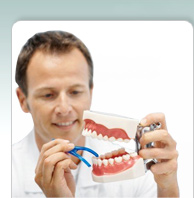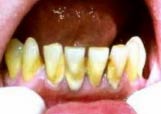 |
 |
|
|
| |
 Periodontal disease -Fig. 1 (gum problems) is the major cause of tooth loss in adults. It is mainly caused by plaque (Click here to know more on plaque and tartar control) and is usually painless. Regular dental visits are essential to timely diagnosis and treatment. |
| |
Early and moderate periodontal disease may exhibit few, if any, symptoms. Signs of advanced periodontal disease may include red, swollen or bleeding gums, persistent bad breath and teeth loosening or separating. |
|
| There are many forms and stages of periodontal disease. Most common are: |
| |
Gingivitis A mild inflammation of the gums caused by plaque build-up. Gums may be red and sore and may bleed on probing. |
| |
| Periodontitis If left untreated, the gum infection damages the bone and supporting tissues. |
| |
Advanced Periodontitis The gums recede further and separate. Pus may develop, bone loss continues and the teeth may loosen or fall out. |
| |
| Plaque and Tartar control |
| |
Plaque is a sticky, colorless deposit of bacteria which is constantly forming on the teeth. Saliva, food and fluids combine to produce these deposits. Plaque build-up is the primary factor in periodontal (gum disease). |
| |
Plaque begins forming on the teeth 4 to 12 hours after brushing, which is why it is so important to brush at least twice daily and floss daily. |
| |
Plaque which is not removed by regular brushing and flossing can harden into unsightly tartar (also called calculus). This crusty deposit can only be removed by a dentist. Tartar formation makes it more difficult for you to remove new plaque and bacteria. |
| |
| |
| These photographs show mild and severe tartar formation. |
| |
| |
|
| |
| |
| Back |
|
|
|
| Site Map |
|
Site Designed & Maintained by Epigram Digital |
|



